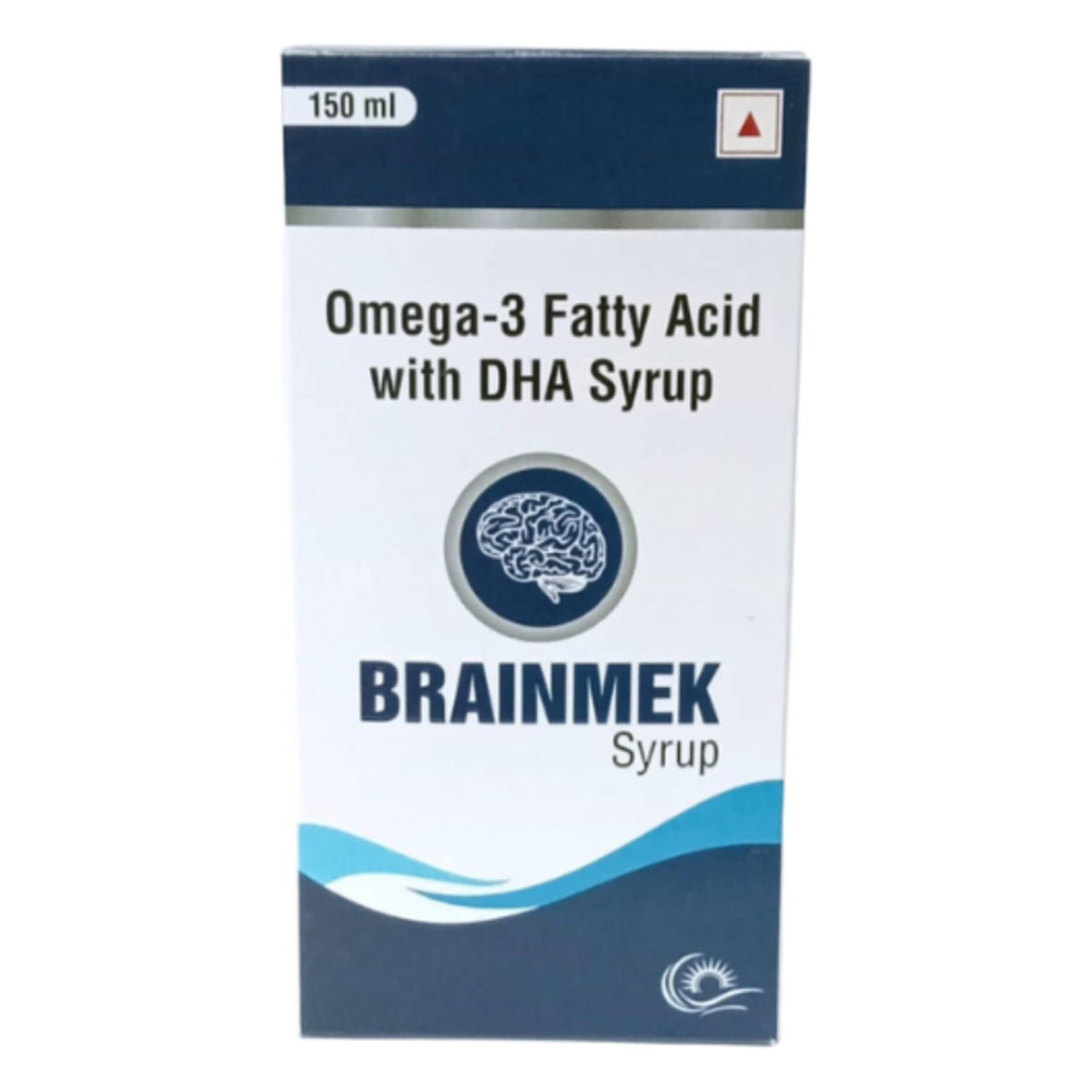Omega 3 Fatty Acid
About Omega 3 Fatty Acid
Omega 3 Fatty Acid is used to lower high triglycerides, reduce heart disease risk, and support a healthy body. It is used as an adjunct in the treatment of cardiovascular health, cancer prevention, Alzheimer's disease, cognitive function, dementia, age-related macular degeneration, dry eye disease, and arthritis.
Omega 3 Fatty Acid contains omega-3 fatty acids, which help produce energy by moving fatty acids into the mitochondria and also act as an antioxidant to protect cells from damage.
In some cases, Omega 3 Fatty Acid may cause side effects, including nausea, an unpleasant taste, bad breath, and stomachache. Most of these side effects do not require medical attention. However, talk to your doctor if you experience these side effects persistently.
Inform the physician if you are allergic to any of the components in Omega 3 Fatty Acid. Inform your doctor if you suffer from hypersensitivity, uncontrolled diabetes, liver disease, kidney disease or any disease-causing chronic diarrhoea. Inform the doctor if you are pregnant or breastfeeding before taking Omega 3 Fatty Acid.
Uses of Omega 3 Fatty Acid
• Lowering triglyceride production: Omega 3 Fatty Acid reduces the liver's synthesis of triglycerides, leading to lower blood levels.
• Supports heart health: Omega 3 Fatty Acid helps reduce cholesterol and aids heart health.
• Boosts brain function: Omega 3 Fatty Acid enhances memory, focus, and cognitive abilities.
• Reduces inflammation: Omega 3 Fatty Acid useful in lowering inflammation.
• Promotes eye health: Omega 3 Fatty Acid helps protect against age-related vision problems.
• Essential for pregnancy: Omega 3 Fatty Acid helps in foetal brain and nervous system development.
• Strengthens the immune system: Omega 3 Fatty Acid enhances the body’s ability to fight infections.
Medicinal Benefits
- Omega 3 Fatty Acid is a nutritional supplement that contains Omega-3 fatty acids. It is primarily used to generate energy and stamina in the body, making it stronger, especially in cases of chronic diseases where the body tends to become weakened.
- It promotes general well-being and health by improving muscle quality and stamina.
- Omega-3 fatty acids significantly reduce inflammation and help decrease biological markers of infection, thereby calming the body in the event of infection or disease.
- It also finds application in reducing the damage caused by heart failure, preventing ageing, improving brain function, easing aches due to stress, enhancing appearance, and bettering the body's exercise tolerance and immunity.
- Omega 3 Fatty Acid is an excellent boost for overall well-being and energy levels.
- Omega 3 Fatty Acid is also highly beneficial in healing muscle and joint pain, supplementing nutrition in case of chronic diseases, enhancing eye health and promoting overall mental and physical well-being.
Directions for Use
- Omega 3 Fatty Acid can be taken with or without food, or as advised by a doctor.
- Follow your doctor's instructions on the dosage and timing of this medication.
- Swallow the medicine as a whole with a glass of water.
- Do not split, crush, chew, or dissolve it.
Storage
Side Effects of Omega 3 Fatty Acid
- Nausea
- Vomiting
- Stomach upset
- Loss of appetite
- Bad breath
- Unpleasant taste in the mouth
Drug Warnings
- Inform the physician if you are allergic to any of the components in Omega 3 Fatty Acid.
- Keep your physician informed if you suffer from hypersensitivity, uncontrolled diabetes, liver disease, kidney disease or any disease-causing chronic diarrhoea.
- Consult the doctor if you are pregnant, planning to get pregnant, or if you are breastfeeding.
Drug Interactions
Drug-Drug Interactions: Inform the doctor if you are taking blood-thinners and anticoagulants (warfarin, apixaban, alteplase and Coumadin).
Drug-Food Interactions: No interactions found.
Drug-Disease Interactions: Omega 3 Fatty Acid should be used with caution in patients with known hypersensitivity, uncontrolled diabetes, liver disease, kidney disease or any disease-causing chronic diarrhoea.
Drug-Drug Interactions Checker List:
Safety Advice
Alcohol
cautionExercise caution before taking alcohol with Omega 3 Fatty Acid. Consult your doctor if you have any concerns.
Pregnancy
consult your doctorNot enough studies have been done on pregnant women. Please consult your doctor if you have any concerns.
Breast Feeding
consult your doctorNot enough information is available on whether Omega 3 Fatty Acid is safe to use during breastfeeding. Please consult your doctor if you have any concerns.
Driving
safe if suggestedOmega 3 Fatty Acid is unlikely to affect your ability to drive.
Liver
consult your doctorOmega 3 Fatty Acid is probably safe on the liver. Please consult your doctor if you have any concerns.
Kidney
consult your doctorOmega 3 Fatty Acid is probably safe on the kidney. Please consult your doctor in case of any concerns.
Children
consult your doctorPlease consult your physician if you have any concerns regarding the usage of Omega 3 Fatty Acid in children.
Habit Forming
Diet & Lifestyle Advise
- Limit the intake of salt in your diet.
- Cut back on foods that are high in fat and cholesterol. Eat more fruits, vegetables and whole-grain foods.
- Opt for plenty of green leafy vegetables and seasonal fruits.
- Stay hydrated by drinking plenty of water.
- Doing weight-bearing exercises such as brisk walking, jogging, tennis, or even dancing can be very useful in promoting overall physical health. However, do not over-exert yourself if you feel too tired.
- Muscle training activities such as yoga and Pilates can also be very helpful.
- Avoid stress and try meditation and psychotherapy to reduce stress and to take care of mental health.
Patients Concern
Disease/Condition Glossary
Congestive Cardiac Failure: It is a condition where the heart isn't able to pump blood effectively through the body, resulting in symptoms such as fatigue, lethargy, shortness of breath, loss of balance, lack of concentration and rapid heartbeat.
Hypercholesterolaemia: Hypercholesterolaemia refers to high blood cholesterol. A lipid profile helps in diagnosing this disorder. Cholesterol is a type of lipid that moves through the blood vessels.
Dementia: Dementia is a chronic disorder of the mind characterised by personality changes, memory dysfunction and loss of proper mental reasoning.
Alzheimer’s Disease: Alzheimer’s disease is a progressive neurological disorder that makes the brain cells shrink and die, thereby impacting memory, cognition and personality. Alzheimer’s has three stages: mild, moderate, and severe. it is a progressive disease if not treated.
FAQs
Omega 3 Fatty Acid is used to lower increased triglyceride levels, risk of coronary heart disease, and help build and maintain a healthy body. It is used as an adjunct in the treatment of cardiovascular health, infant health and development, cancer prevention, Alzheimer's disease, cognitive function, dementia, age-related macular degeneration, dry eye disease, and arthritis.
Omega 3 Fatty Acid works by enhancing cellular energy production and providing the body with stamina.
Omega 3 Fatty Acid is very useful in supplying muscles with energy, but for more details, please contact your physician if you have fibromyalgia.
One of the common side effects of Omega 3 Fatty Acid is an upset stomach. Hence, it is best to consult your physician before taking Omega 3 Fatty Acid if you suffer from IBS.
No, it is not advisable to use Omega 3 Fatty Acid with agents that promote bleeding. In any case, please consult your doctor for any concerns.
If you miss a dose, take it as soon as you remember, unless it is too close to the time of the next dose; in that case, skip the missed dose and resume your original schedule.
Available Medicines for
Omega 3 Fatty Acid

Brainaxo Shot 1200 mg Sugar Free Orange Flavour Sachet 30x2.5 gm
1 Pack
₹71.1 (MRP 79)10%Off
cashback: 0







